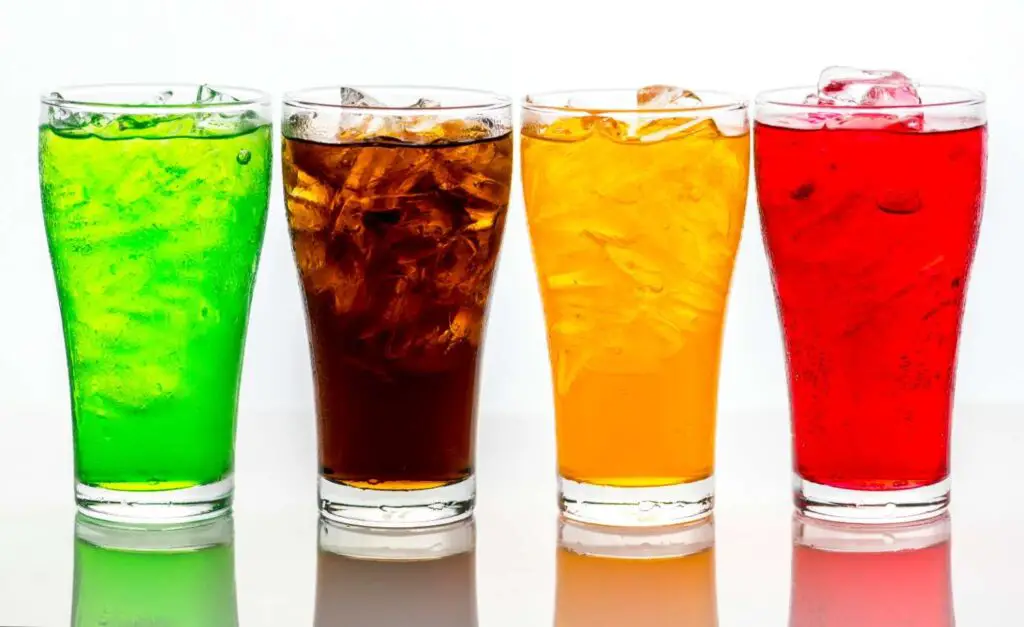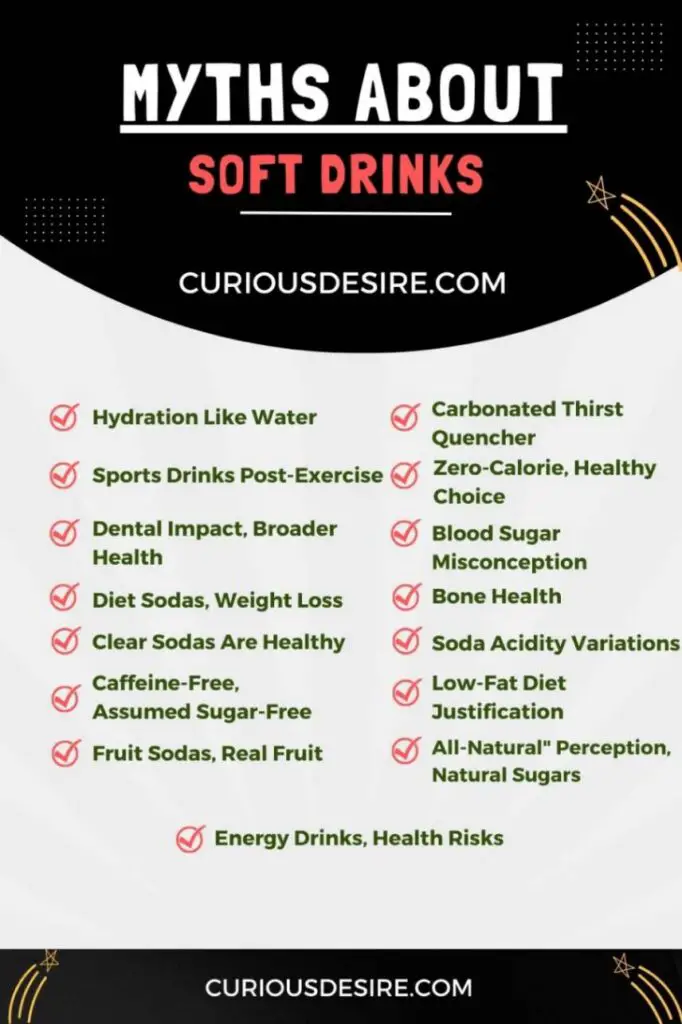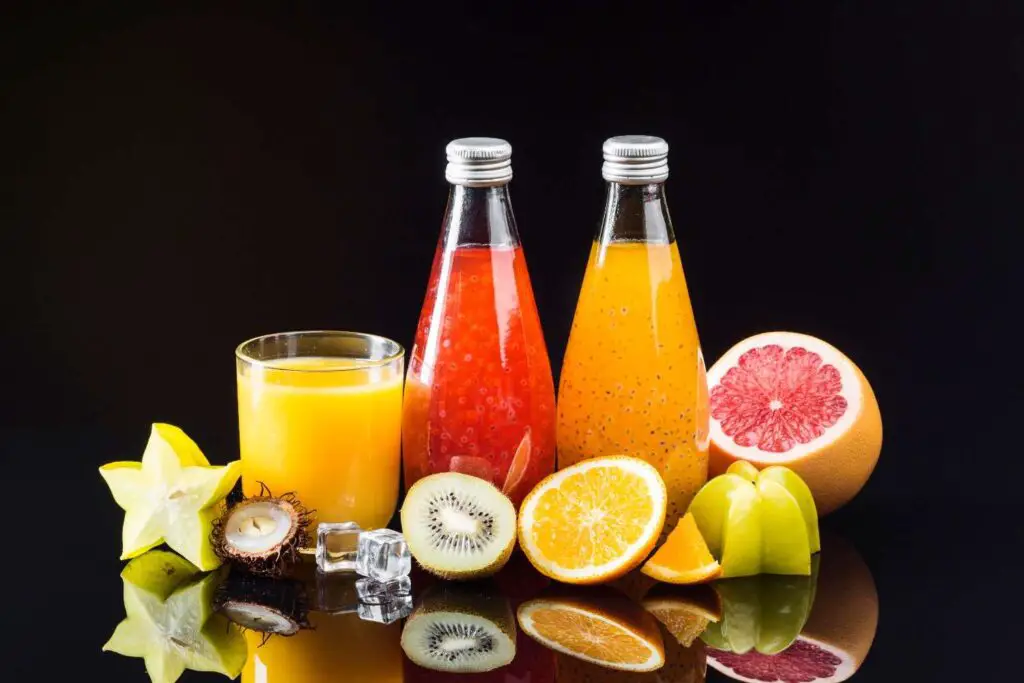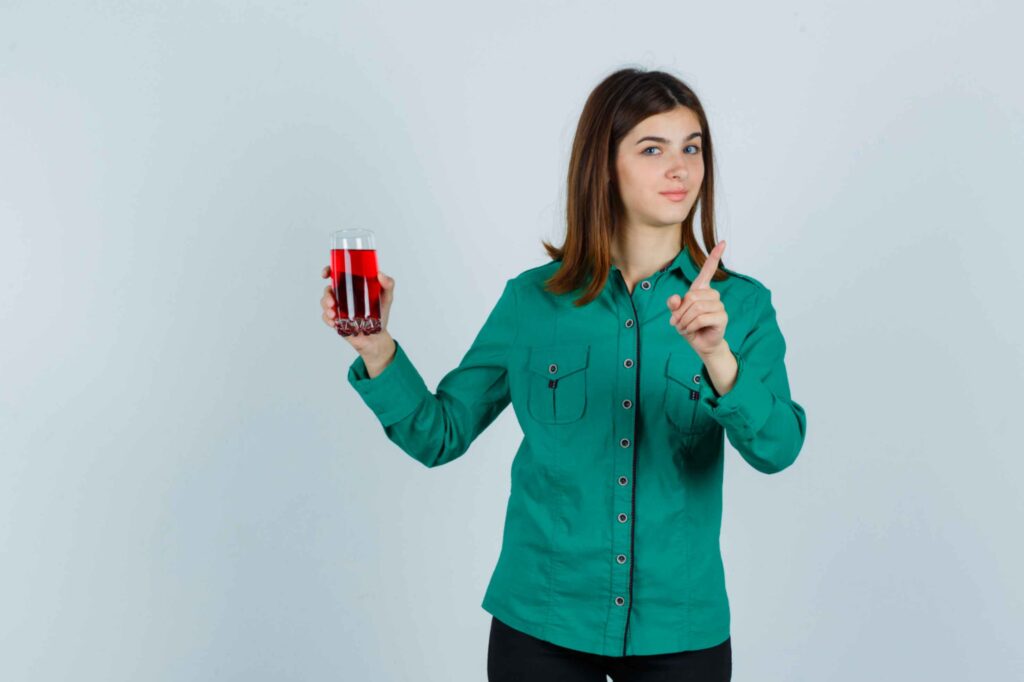Here are the top 5 common misconception about the soft drinks.
- Soft drinks hydrate as effectively as water.
- Sports drinks are essential for rehydration after physical activity.
- Diet sodas with artificial sweeteners help in weight loss.
- Opting for zero-calorie sodas is synonymous with making a healthy beverage choice.
- There’s a misconception that soft drinks have no impact on blood sugar.
Myth 1: Soft Drinks Hydrate as Effectively as Water
Why This Myth Exists:
The misconception that soft drinks hydrate as effectively as water likely exists because both contain water, which is essential for hydration. However, soft drinks also contain sugar and caffeine, which can have diuretic effects, potentially increasing urine output and offsetting hydration.
While the water content contributes to hydration, the additional ingredients in soft drinks may counteract their effectiveness compared to plain water.
Debunking This Myth:
Myth 2: Sports Drinks are Essential for Rehydration After Physical Activity
Why This Myth Exists:
The belief likely exists because the marketing emphasizes the role of sports drinks in replacing lost electrolytes, sometimes creating an inflated perception of their necessity for rehydration after exercise.
Sports drinks contain electrolytes like sodium and potassium, which are lost through sweat during exercise. While these electrolytes are important for hydration, for most people engaged in moderate physical activity, water is sufficient to restore fluids.

Debunking This Myth:
Challenging the belief involves understanding the specific needs of the individual and the ingredients in these beverages.
Sports drinks often contain electrolytes such as sodium, potassium, and chloride, which are beneficial for intense and extended exercise. Some examples of sports drinks that provide these electrolytes include Gatorade, Powerade, and Pedialyte.
These beverages are formulated to help replace the electrolytes lost through sweat during vigorous physical activity, aiding in maintaining proper fluid balance and preventing dehydration.
For individuals engaging in moderate activities, water remains the optimal choice for rehydration, providing effective fluid renewal without unnecessary additives.
Scientifically, the electrolyte loss in moderate exercise is generally within a manageable range that can be adequately addressed through a balanced diet.
Sports drinks may be more suitable for athletes with high sweat rates and extended physical effort, but for the average person, water remains the most efficient and healthy option for rehydration after exercise.
Myth 3: Soft Drinks Only Affect Dental Health, Overlooking Broader Health Implication
Why This Myth Exists:
Existence of this misconception is because the immediate impact of sugary drinks on teeth is more noticeable. However, the belief overlooks broader health implications.
The focus on dental health alone may come from the visible and rapid effects on teeth, overshadowing the more gradual but significant overall health risks associated with frequent soft drink consumption.
Debunking This Myth:
While it’s true that soft drinks can harm dental health due to their high sugar and acidity, busting the misconception involves recognizing the broader health implications.
The sugar and calories in soft drinks contribute to weight gain and an increased risk of conditions like diabetes and heart disease. Scientifically, excessive sugar intake is linked to metabolic disorders, while the overall caloric content in sugary drinks can contribute to obesity.
Therefore, it’s important to understand that the negative effects of soft drinks extend beyond dental health, impacting our overall well-being.
Opting for healthier beverage choices is important to mitigate these broader health risks associated with regular soft drink consumption. Some examples include:
- Water: The ultimate hydrator with no added sugars or calories.
- Herbal Teas: Naturally caffeine-free options with various flavors and potential health benefits.
- Green Tea: Packed with antioxidants, green tea is known for its potential health-promoting properties.
- Infused Water: Adding natural flavors like fruits, herbs, or cucumbers to water for a refreshing taste without added sugars.
- Coconut Water: A hydrating and naturally sweet option, rich in electrolytes.
- Vegetable Juices: Blends of fresh vegetables without added sugars can be a nutritious choice.
Myth 4: Diet Sodas with Artificial Sweeteners Help in Weight Loss
Why This Myth Exists:
The misunderstanding likely exists because these drinks contain fewer calories than regular sodas, creating the perception of a healthier option. Artificial sweeteners provide sweetness without the added calories from sugar.
However, studies suggest that the artificial sweet taste might stimulate cravings for sugary foods, potentially leading to increased calorie intake, undermining the initial belief in weight loss benefits.

Debunking This Myth:
Myth 5: Clear Sodas are Healthier Than Colored Ones
Why This Myth Exists:
Debunking This Myth:
Clear sodas are inherently healthier involves recognizing that the color is not the primary factor determining a drink’s healthiness. Both clear and colored sodas can be unhealthy due to high sugar content and lack of nutritional value.
The perception that clear sodas are better often comes from the absence of artificial coloring, but it doesn’t address the fundamental issue of excessive sugar consumption.
In reality, the healthiness of a soda depends on factors like sugar content, additives, and overall nutritional value, rather than just its color. Choosing water or other low-sugar, nutrient-rich beverages remains a more health-conscious choice.
Myth 6: Caffeine-Free Sodas are Assumed to be Sugar-Free
Why This Myth Exists:
Debunking This Myth:
Myth 7: Fruit-Flavored Sodas Contain Significant Amounts of Real Fruit
Why This Myth Exists:
Debunking This Myth:
Myth 8: Energy Drinks are Suitable for Everyone, Ignoring Potential Health Risks
Why This Myth Exists:
Debunking This Myth:
Myth 9: Sodas Labeled as “All-Natural” are Perceived to Contain Only Natural Sugars
Why This Myth Exists:
Debunking This Myth:
Myth 10: The Effervescence of Carbonated Drinks is Believed to Quench Thirst Effectively
Why This Myth Exists:
Existence of this belief is likely because the bubbles create a refreshing sensation. People associate the fizzy feeling with hydration, thinking it provides a more satisfying thirst-quenching experience.
However, carbonated drinks often contain sugar or artificial sweeteners, which may not be the ideal choice for rehydration.
The belief in effervescence as a thirst-quencher can overshadow the potential negative impacts of added ingredients in these beverages.

Debunking This Myth:
Myth 11: Opting for Zero-Calorie Sodas is Synonymous with Making a Healthy Beverage Choice
Why This Myth Exists:
Debunking This Myth:
Myth 12: There’s a Misconception that Soft Drinks Have No Impact on Blood Sugar
Why This Myth Exists:
Debunking This Myth:
Myth 13: Soft Drinks are Mistakenly Seen as Having No Impact on Bone Health
Why This Myth Exists:
Debunking This Myth:
Myth 14: People Assume All Sodas Have the Same Level of Acidity, Overlooking Variations
Why This Myth Exists:
Debunking This Myth:
Myth 15: Individuals on Low-Fat Diets May Think Regular Soda Consumption is Justified
Why This Myth Exists:
Debunking This Myth:


